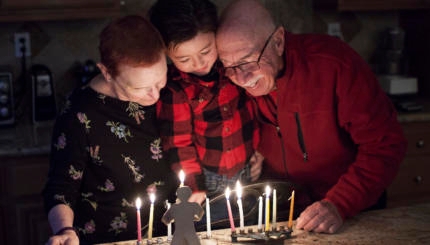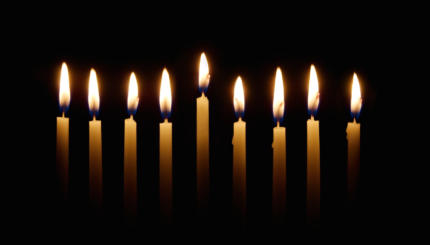Yes, everyone in the Jewish world and beyond knows today is Thankgivukkah. But there’s another quirk of the calendar that Hanukkah gives us every year—and is one that very few people seem to know about.

It just so happens that the night we light the seventh candle is always also one of the darkest nights of the year. Not the shortest night, but the darkest night, owing to the new, tiny, sliver of a moon — Rosh Hodesh Tevet, the new month of Tevet, begins at sundown of the seventh night of Hanukkah. In other words, the seventh night of Hanukkah is one of two nights that are closest to the winter solstice on which there is no visible moon. (The second is Rosh Hodesh Shevat, which falls on January 1st this year.)
I highly doubt that this was an intentional placement on the calendar. It’s just as “planned” as the fact that we’re likely to be in the Torah portions telling the Joseph story during Hanukkah, as well—the seventh night of Hanukkah falls on this ultra-dark night of the year occurs just because a few different ways of setting Jewish time happen to coincide. But I find that there’s something quite powerful in knowing that the seventh night of Hanukkah is the night that most requires us kindle lights.
On the seventh night, our Hanukkiah is almost full. With eight of the nine candles flickering in the window, we see almost all of our lights. As Hanukkah in general reminds us of holding onto hope in the most difficult times, lighting the Hanukkiah reminds us that we can bring light even in the darkest times. And on this dark night, we are using almost all of our candles to bring some light into this world.
But the key word there is “almost”—we are not bringing all of our lights. We might think that it would be great if this dark night happened to fall on the eighth night, the night on which our Hanukkiah is full and we would make a powerful statement that “Even in our darkest times, we can bring all of our lights to shine!”
Except our Hanukkiah is not full on this specific night. There’s one candle missing—and that’s wonderful, because it reminds us of so many other things we might forget otherwise. It reminds us that even when we bring our light, there is still darkness in this world, for our world is not yet redeemed. It reminds us that there is still more work that needs to be done, and so there is always more light we can bring. It reminds us that even in our happiest times, life is not all joyous—we all face moments of doubt and despair, and those are parts of the human condition, as well.
And yet for me, knowing that there is one “missing” light reminds me most of the words of Rabbi Tarfon—”Lo alecha ham’lcha ligmor, v’lo atah bein chorin l’hibatel mimenah,” which we usually translate it as “It is not upon you to complete the work, but neither are you free to desist from it.” Often we take that to mean, “The world is never going to be perfect – but we have to try.” I read it a little bit differently. The Hebrew says, “Lo alecha”—”it is not upon you,” and the word for “you”—alecha—in the singular. So I read that quote as, “It is not upon each of us by ourselves to complete the work—but we do have to do our part to the best our ability.”
So the message of Rosh Hodesh Tevet, the seventh night of Hanukkah, is that there is always something we can do to help bring more light into this dark world – and there is always something we must do.
Hanukkah
Pronounced: KHAH-nuh-kah, also ha-new-KAH, an eight-day festival commemorating the Maccabees’ victory over the Greeks and subsequent rededication of the temple. Falls in the Hebrew month of Kislev, which usually corresponds with December.
Torah
Pronunced: TORE-uh, Origin: Hebrew, the Five Books of Moses.



